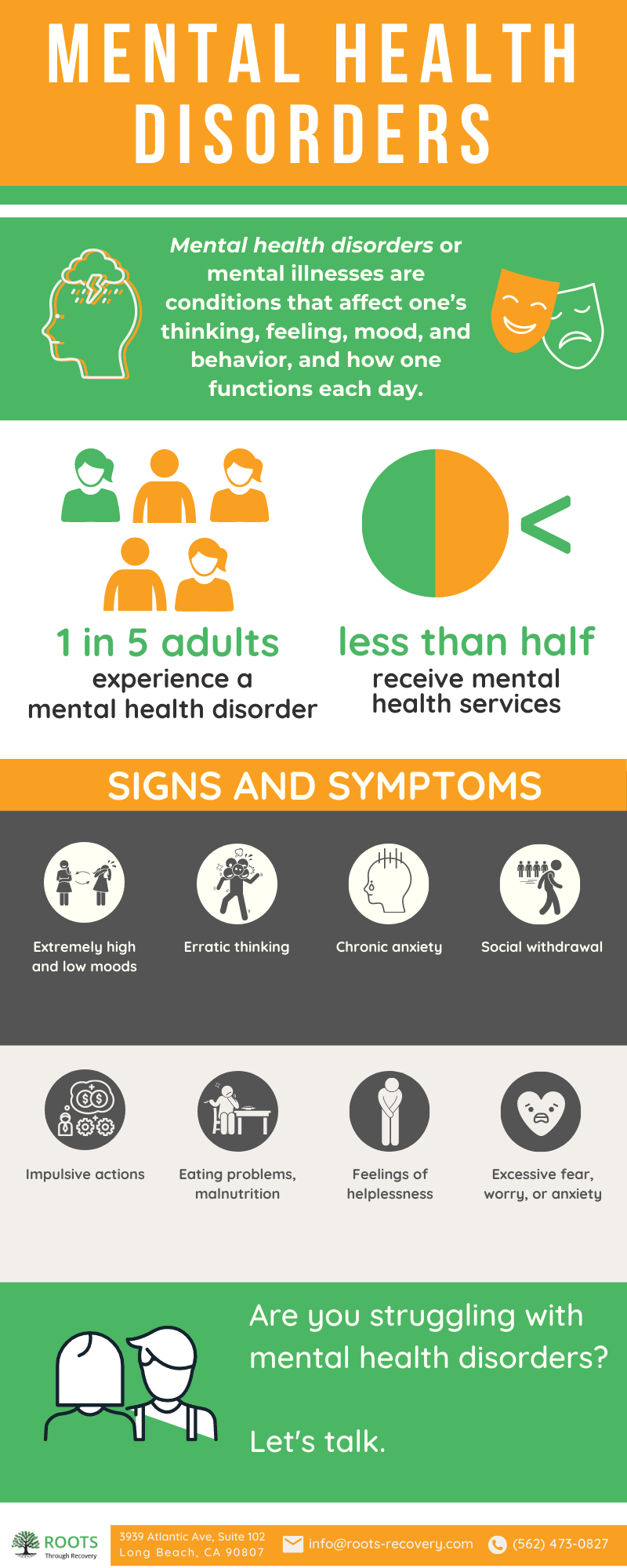
Mental Health Disorder Treatment
We often go about our day ignoring the signs and symptoms of mental health issues or explaining them away using examples of others in our lives. Many of us have been taught to just “get over it” or to push through, as these things are just temporary. But this isn’t true without proper care. Studies show that 1 in 5 adults in the United States experience a mental health disorder, yet less than half of these people receive mental health services to address these issues. This is in part due to the societal and cultural stigmas surrounding accessing services. Oftentimes people don’t recognize they have the need for help, particularly as the symptoms can range from mild feelings of depression to anxiety attacks or suicidal ideation. Although medication can be helpful in managing symptoms, it alone does not address the underlying causes of mental health disorders. Roots Through Recovery specializes in uncovering what is beneath the surface and giving you the tools to manage these issues in your daily life. Additionally, we offer a free assessment test that one can take.
What is it?
A mental health disorder or mental illness is a condition that affects one’s thinking, feeling, mood, behavior, and how one functions each day. They can either be occasional or long-lasting (chronic). There is no single cause for mental health disorders. Instead, they can be caused by a mixture of biological, psychological, and environmental factors.
What are the common types?
- Trauma/PTSD
- Depression
- Anxiety
- Bipolar Disorder
- Obsessive-Compulsive Disorder
- Attention Deficit Hyperactivity Disorder
- Attachment Disorder
- Mood Disorders
- Personality Disorders
What are the signs and symptoms?
Mental health problems can cause a wide variety of emotional symptoms, some of which include:
Extremely high and low moods
Erratic thinking
Chronic anxiety
Exaggerated sense of self-worth
Impulsive actions
Weight loss
Fatigue
Malnutrition
Alienation from peers
Feelings of helplessness
Long-lasting sadness or irritability
Excessive fear, worry, or anxiety
Social withdrawal
Dramatic changes in eating or sleeping habits
FAQs
Q: How will I know when to get help?
A: Contrary to popular misconception, you don't have to be desperate or "crazy" to go to seek help. Most people can benefit from therapy at some point in their lives. Some signs are obvious, while some are not. If you feel slightly off and cannot figure out what it is, it would be best to seek help before this becomes unmanageable.
Q: Is there a self-assessment I can do to know if I have a mental health disorder?
A: While there are online questionnaires you can take, it is almost impossible to accurately diagnose yourself for mental disorders. It is best to consult with a qualified professional because they have an outside viewpoint and can also pick up on subtle cues.
Q: Can mental illness run in the family?
A: Mental disorders result from both genetic and environmental factors. Most people with a mental health disorder do not have relatives with the same illness; however, research does suggest that mental illness can run in families. It's important to know that there is no single genetic switch that when flipped causes a mental health disorder. Also, it is difficult for doctors to determine one's risk of inheriting a mental health disorder.
Q: How to talk to someone about mental health?
A: It is important for people suffering from mental health disorders to feel supported. Talking to someone is often the first step to take when you know they are going through a hard time. Provide an open space and let them share as much or as little as they want to. Listen carefully and keep questions open-ended but also know your limits so as not to diagnose or second guess their feelings.
Take the First Step Now
If you need to find a place that feels comfortable and supportive, let Roots Through Recovery’s experienced clinicians and case management team work with you to help determine your next steps. We want you to have choices that will give you and your loved ones the best outcomes.



